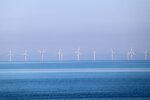Off-shore wind will lead our journey to NetZero, but at what cost to our seas?
The significant award will be used to investigate what environmental impacts the proposed development of a new generation of floating wind farms might have on the marine environment.
Following the huge success of the development offshore wind as a renewable energy source over the past decade, a further fourfold expansion in this form of energy capture is seen as the backbone to the UK (and many other coastal nations) pathway to achieving NetZero by 2050.
Whilst over 99% of current generation of UK offshore wind farm development is based in shallow tidally turbulent and, in consequence, well mixed coastal seas, the proposed massive expansion requires large scale developments in the deeper seas further from shore, as is already planned in the North and Celtic Seas. These deeper waters have distinct temperature layers which change through the seasons and support different ecosystems/ fish and other species.
Post-doctoral Research Fellow, Dr Ben Lincoln explains, “This shift to deeper waters requires the development of radically different turbine foundation designs, with a switch from the current generation of seabed fixed turbines to novel floating platforms. This raises questions about what impacts these new developments may have on nature and the environment.”
The shelf seas are considered some of the most biologically productive seas on the planet. The new research will examine the impacts of the new developments on these sensitive ecosystems, and in particular the turbulent wakes associated with tidal flow past the floats, and the associated mixing between waters of different temperatures and salinity.
These developments could produce some positive aspects on the marine ecosystem, such as counteracting some of the impacts of a warming ocean. It is hoped that the new research will guide design and planning of these vital new developments to ensure they are sustainable in protecting local wildlife.
Could these floating wind farms have a positive impact on fisheries?
Beyond protecting wildlife, these new developments could also help to generate new fisheries, as proposed in a paper by Bangor University Ocean Sciences scientists John Simpson and Paul Tett 36 years ago!
Commenting further Ben Lincoln says: “Floating offshore wind provides a huge opportunity for the UK in reaching NetZero, and in creating jobs. Over 50 years of novel research here at the School of Ocean Sciences shows us that that optimising float design and wind farm layout could help mitigate against the negative impacts of climate change, as well helping grow new sustainable fisheries in these regions. We hope that our planned research will help to ensure the maximum positive impacts and sustainability of these developments.”
The new research involves Tom Rippeth, Ben Lincoln, Ben Powell and Martin Austin.
- Source:
- Bangor University
- Author:
- Press Office
- Link:
- www.bangor.ac.uk/...
- Keywords:
- Bangor University, Net zero, offshore, wind, UK, funding, research, environment, costs, development, coastal sea, ecoystem, floating






















